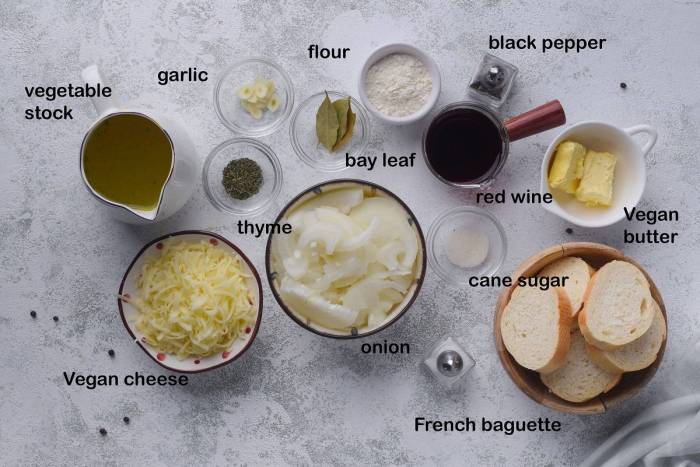Macronutrient Breakdown of French Onion Soup

French onion soup nutrition facts – French onion soup, a classic comfort food, boasts a rich and savory flavor profile, but its nutritional content can vary significantly depending on the recipe. Understanding the macronutrient composition—carbohydrates, proteins, and fats—is crucial for making informed dietary choices. This section will delve into a typical macronutrient breakdown and explore how variations in ingredients influence the overall nutritional profile.
Macronutrient Composition of a Standard Serving, French onion soup nutrition facts
A standard serving of French onion soup (approximately 1.5 cups) typically contains a moderate amount of carbohydrates, a relatively low amount of protein, and a variable amount of fat, depending on the recipe. The following table provides a representative breakdown:
| Nutrient | Amount per Serving | % Daily Value | Notes |
|---|---|---|---|
| Carbohydrates | 25-35g | 8-12% | Primarily from onions and broth; may include added sugars depending on the recipe. |
| Protein | 5-10g | 10-20% | Source primarily from beef broth (if used); may be slightly higher with added meat. |
| Fat | 5-15g | 8-23% | Source varies greatly depending on the type of broth and added ingredients (e.g., butter, cheese, croutons). Saturated fat content is higher with the use of butter or full-fat cheese. |
It’s important to note that these values are estimates and can fluctuate considerably based on individual recipes.
Variations in Macronutrient Composition Based on Recipe
The macronutrient profile of French onion soup is highly adaptable and changes dramatically depending on the ingredients used.
Several factors significantly impact the macronutrient content:
- Type of Broth: Using a beef broth will increase the protein content and fat content (depending on the fat content of the beef broth). Vegetable broth will lower the protein and fat, but may increase the carbohydrate content depending on the vegetables used in the broth.
- Added Ingredients: Croutons significantly increase the carbohydrate content and add some fat. The addition of cheese (especially full-fat cheese like Gruyère) dramatically increases the fat and protein content. Adding wine or other alcoholic beverages increases the carbohydrate content.
- Type of Onion: Different types of onions have slightly varying carbohydrate and sugar content.
- Added Meats: Adding beef, chicken, or other meats increases the protein and fat content significantly.
Comparison to Similar Dishes
Compared to other similar dishes, French onion soup occupies a unique space nutritionally.
For instance:
- Beef Stew: Typically higher in protein and fat than French onion soup, due to the larger quantity of meat. Carbohydrate content is usually lower, unless significant amounts of root vegetables are added.
- Vegetable Soup: Generally lower in fat and protein than French onion soup, with a higher carbohydrate content due to the increased proportion of vegetables.
Micronutrient Content of French Onion Soup

French onion soup, while seemingly simple, offers a surprising array of micronutrients thanks to its key ingredients. These essential vitamins and minerals contribute significantly to overall health and well-being, enhancing the nutritional value beyond the macronutrients already discussed. Understanding the micronutrient profile allows for a more complete appreciation of this classic dish’s impact on our bodies.
Micronutrient Composition and Sources
The following table details the essential vitamins and minerals commonly found in a typical serving of French onion soup, highlighting their sources within the ingredients. Note that the amounts can vary depending on the recipe and ingredients used. These values are estimates based on average ingredient compositions.
| Micronutrient | Amount per Serving (Estimate) | Health Benefit | Ingredient Source |
|---|---|---|---|
| Vitamin C | ~10mg | Supports immune function, antioxidant properties. | Onions (especially if using red onions), potentially added herbs (parsley, thyme). |
| Vitamin B6 (Pyridoxine) | ~0.2mg | Essential for brain development, red blood cell formation. | Onions, beef broth (if used). |
| Potassium | ~200mg | Regulates blood pressure, muscle function. | Onions, beef broth (if used). |
| Folate | ~5mcg | Crucial for cell growth and development, especially during pregnancy. | Onions, potentially added herbs. |
| Manganese | ~0.5mg | Bone health, wound healing, metabolism. | Onions. |
| Iron | ~1mg (variable) | Oxygen transport, energy production. | Beef broth (if used). Amount highly dependent on broth type and quantity. |
Impact of Cooking Methods on Micronutrient Content
Different cooking methods can affect the micronutrient content of French onion soup. For instance, prolonged boiling can lead to some water-soluble vitamin losses (like Vitamin C and some B vitamins). However, the caramelization process of the onions, which is crucial to the soup’s flavor, actually increases the bioavailability of certain antioxidants. Using lower heat for longer caramelization can potentially preserve more micronutrients than high-heat, quick caramelization.
Similarly, the choice of broth (vegetable or beef) significantly impacts the micronutrient profile, particularly regarding iron and certain B vitamins.
Potential Micronutrient Deficiencies or Excesses
A typical serving of French onion soup is unlikely to provide excessive amounts of any micronutrients, barring potential exceptions based on unusually high ingredient concentrations. However, it’s important to note that it’s not a complete source of all micronutrients. For instance, the amount of Vitamin C and folate might be relatively low compared to recommended daily intakes. Similarly, iron content is heavily dependent on the use of beef broth and its concentration.
Understanding French onion soup nutrition facts requires considering its high sodium content and caloric density from the broth and bread. A contrasting example, offering a drastically different nutritional profile, can be found by examining the nutrition facts of a tootsie pop , which is notably lower in calories and sodium but higher in sugar. Returning to French onion soup, mindful portion control is key to managing its nutritional impact.
Therefore, relying solely on French onion soup for micronutrient intake would likely lead to deficiencies in various essential nutrients. It should be considered a part of a balanced diet, rather than a sole source of micronutrients.
Dietary Considerations and Modifications: French Onion Soup Nutrition Facts
French onion soup, while undeniably delicious, can present challenges for those with specific dietary needs or restrictions. Understanding how to adapt the recipe allows everyone to enjoy this classic dish while maintaining a healthy and balanced diet. This section explores modifications for various dietary requirements and their impact on the soup’s nutritional profile.
Adapting French onion soup recipes to accommodate different dietary needs often involves strategic substitutions and mindful ingredient choices. These changes can significantly alter the nutritional content, impacting calorie count, fat content, sodium levels, and the overall balance of macronutrients and micronutrients. Let’s explore some common dietary modifications and their implications.
Low-Sodium French Onion Soup Modifications
High sodium intake is a concern for many. Reducing sodium in French onion soup is achievable through several key adjustments. The primary source of sodium is often the broth and any added salt.
- Use low-sodium or no-salt-added beef broth (or vegetable broth for vegetarian versions).
- Reduce or eliminate added salt during the cooking process. Taste the soup at the end and add only a minimal amount if needed. Many individuals find that the natural sweetness of the caramelized onions provides ample flavor without excessive salt.
- Consider using herbs and spices like black pepper, thyme, rosemary, or bay leaf to enhance the flavor profile without relying on salt.
Low-Fat French Onion Soup Modifications
Reducing fat content in French onion soup primarily focuses on the type of broth and the addition of any dairy. Traditional recipes often utilize rich beef broth and a generous topping of cheese.
- Use low-fat beef broth or vegetable broth as a base. This significantly reduces the saturated fat content.
- Reduce the amount of cheese used as a topping, or opt for a lower-fat cheese alternative, such as reduced-fat Gruyère or Swiss cheese. A sprinkle of Parmesan cheese can still provide a savory flavor with less fat.
- Avoid adding excessive butter or oil during the caramelization of the onions. Use a non-stick pan and cook the onions over low heat to prevent sticking and minimize the need for added fat.
Vegetarian/Vegan French Onion Soup Modifications
Creating a vegetarian or vegan version of French onion soup involves substituting the beef broth with a flavorful plant-based alternative. This change also requires consideration of any dairy products used in the topping.
- Replace beef broth with a rich vegetable broth. Look for low-sodium options to control sodium content.
- For a vegan option, ensure the vegetable broth is vegan-friendly. Many store-bought broths contain ingredients derived from animal products.
- Use a vegan cheese alternative as a topping, such as nutritional yeast, which provides a cheesy flavor and adds nutritional value.
Impact of Broth Substitution on Nutritional Profile
Substituting beef broth with vegetable broth significantly alters the nutritional profile. Beef broth contributes to the protein and iron content of the soup, while vegetable broth provides more vitamins and minerals depending on the vegetables used in its production. The fat content will generally be lower in vegetable broth, and the sodium content can vary depending on the brand and type.
A careful selection of a low-sodium vegetable broth can result in a healthier soup overall. For example, using a vegetable broth made with mushrooms would add umami flavor and B vitamins.
Recipe for a Low-Calorie, Healthy French Onion Soup
This recipe focuses on maximizing flavor while minimizing calories and fat.
- Sauté 3 large yellow onions, thinly sliced, in 1 tablespoon of olive oil over low heat until deeply caramelized (about 45 minutes). This slow cooking process enhances the sweetness of the onions without requiring excessive oil.
- Add 4 cups of low-sodium vegetable broth and 1 cup of water to the pot. Bring to a simmer.
- Simmer for 15 minutes to allow the flavors to meld. Add a teaspoon of dried thyme and a bay leaf for added depth of flavor.
- Remove the bay leaf. Season with freshly ground black pepper to taste (avoid adding salt unless absolutely necessary).
- Ladle into bowls and top with a small sprinkle of reduced-fat Gruyère cheese or a vegan cheese alternative.
FAQ Summary
Is French onion soup good for weight loss?
It depends on the recipe and portion size. A smaller, lower-calorie version made with vegetable broth and less cheese can be part of a weight-loss plan.
Can I make a vegan French onion soup?
Absolutely! Substitute vegetable broth for beef broth and use a vegan cheese alternative for a delicious and plant-based version.
Is French onion soup high in sodium?
Yes, it can be quite high in sodium due to the broth and cheese. Look for low-sodium broth and reduce the amount of cheese to lower the sodium content.
